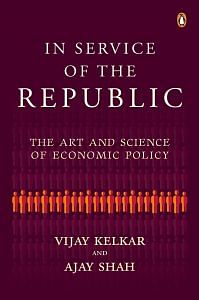Before 1991, most firms in India were managed poorly. We now have a large number of extremely well-run firms in India. The key persons in these firms are legitimately proud of their ability to run large complex organizations. Alongside this, we see the shambolic Indian state, which is unable to get the basics right. Can management skills and techniques carry over from the Indian private sector into government? Unfortunately, the skill and rhythm that is required in the public policy landscape is different from what works in for-profit firms.
Government lacks feedback loops
All big private firms are listed for trading on the stock market and see a stock price. The vast machinery of speculation in financial markets produces a real-time measure of the performance of the firm. Internally, private firms see operational management information system (MIS) statements that are updated daily. Revenue and profit are simple tools to distil the working of the firm down into a numerical yardstick.
Are there comparable measures which can be used in public policy? Is GDP growth a good measure of how the government is faring? In any case, in India, we are at the early stages of learning how to measure GDP. Is the performance of Nifty a good measure of how the government is faring? The movements of the stock market index express surprises in the outlook for corporate profitability; this is only weakly related to the achievements of the leadership. Is the rupee–dollar exchange rate a good measure of how the government is faring? The fluctuations of the exchange rate have nearly no link with how the country is faring.
Depreciation is often beneficial for the economy. When a leadership starts viewing the exchange rate as a measure of its performance, this is generally harmful. There is thus no information system that generates feedback loops for government, in the way that accounting data and stock market data generates feedback loops in private firms.
Also read: Now AI can conduct your job interview at Tata Consultancy, Unilever, Marriott
Government agencies are monopolies
The customers of private firms generally have choices about whom they buy from. State agencies are generally monopolies. The only place that you can get a driver’s licence is a government office; the customer has no choice. The policy thinker Manish Sabharwal once said that RBI’s bond exchange, the Negotiated Dealing System (NDS), ‘has hostages, not customers’. Nobody chooses to be a member of the NDS, they are forced to use it. This diminishes organizational performance. The leadership of a private firm fears financial nonperformance, which will ultimately lead to the loss of jobs and empire. Persistent weak performance can induce a sale of the firm to a new shareholder, who can impose painful changes upon the firm.
Private firms face the threat of a bankruptcy process where the firm can be shut down or fundamentally reorganized. None of these possibilities influence employees in the government. There are rare events where a government agency is closed down. Politicians fear losing elections. Officials have no fear. The RBI was created in 1934. Consider the thousand-odd large private firms which also existed in 1934. By 2019, most of these firms had gone under, in the face of competitive pressure. The survivors (e.g., Tata Steel) were unrecognizably different, in 2019, compared with their organizational capabilities of 1934. But the RBI of 1934 has survived into 2019 without facing any competitive pressure, while having small changes in its organizational capabilities. With private firms, we see something remarkable in the organizational culture of a Tata Steel or an IBM—firms that have managed to stay relevant over very long time periods. In government, in contrast, the oldest agencies are likely to have the most outdated internal arrangements. Government’s coercive power is qualitatively different In a private firm, the levers controlled by the management cover products, production processes and the internal organization of the firm.
In government, there is similar decision-making power about the internal organization of government. But the surpassing feature of government is the monopolistic power to coerce. The state has a monopoly on violence. It is able to coerce private persons, either to pay taxes or to change behaviour. This yields a fundamental arrogance about state organizations, that private organizations do not suffer from. The puzzle of public policy lies in reining in employees who have the power to coerce, to prohibit, to raid and to imprison.
Also read: India’s ranking in world Fragility Index continued worsening after Modi govt came to power
Government has greater complexity
A big firm in India has 25,000 employees. Compared with this, state structures are vast. Indian Railways has 1.3 million employees. Even if the efficient staffing at Indian Railways is half this size, it is a vast and complex organization when compared with what we see in the private sector. The public policy process plays out not just through employees but through everyone, as coercive steps by the state induce changed behaviour by the people, which feeds back into the working of the state, and so on. This further increases the complexity of decision making.
Policy decisions have to take into account the internal behaviour of large complex government organizations, and then the responses of the general public which in India’s case is above a billion people. This is a scale of complexity which is just not found in private firms.
Governments operate on longer horizons
Many in the world of business have come to revere the alpine-style assault, where a firm builds something very big in almost no time. Instagram got to 10 million users in a year and was bought for $1 billion in two years. A world-straddling company like Google was only founded in 1998. Successful management teams are often imbued with the idea of saving time. The rhythm of public policy is quite different: to do good things requires a long slow ascent. Big sudden phenomena in the world of policy are generally harmful and/or failures.
Also read: What Indian politicians, bureaucrats and military really think about each other
Summing up
We in India revere success and wealth, and there is a lot of respect for business folk. We tend to assume (say) that sound HR practices in TCS will work well in government. But we should be cautious when thinking about transferring expertise into the world of public policy.
Companies have feedback loops where the daily MIS shows how things are faring, where quarterly financial statements are put out, and the stock price is updated in real time. When mistakes are made, they kick off corrections.
Governments have no comparable feedback loops. Most firms operate in competitive marketplaces. When mistakes are made, they lose customers. Governments have hostages, not customers, and there is no choice. Firms wield no coercive power. They have to be nice to customers all the time. Governments wield coercive power.
The danger of functionaries that mistreat individuals is ever-present. Process design for government organizations involves establishing checks and balances against this threat. Big firms are small compared with government organizations.
A lot of decisions in private firms can be tactical. Governments become the most effective when they establish rules rather than discretion, and eschew day-to-day tactical responses.
Governments are bound by equal treatment (Article 14 of the Constitution of India) while private firms have no such constraint. The management of a private firm is often quite autocratic. Successful governments, in contrast, do not have a CEO. Success comes from a long process of debate, negotiation and compromise.
Firms tend to work on short time horizons. The best governments work on long time horizons. For all these reasons, the expertise on the working of private firms does not carry over into public policy, and vice versa. A country is not a company.
 This excerpt from In Service Of The Republic: The Art And Science Of Economic Policy by Vijay Kelkar And Ajay Shah has been published with permission from Penguin Random House India.
This excerpt from In Service Of The Republic: The Art And Science Of Economic Policy by Vijay Kelkar And Ajay Shah has been published with permission from Penguin Random House India.




A lot of decisions in private firms can be tactical. Governments become the most effective when they establish rules rather than discretion, and eschew day-to-day tactical responses.
In other words, Govt got no business doing business…..
For a government willing to listen carefully, there are a billion daily feedback loops. From within its own formal structures, staffed by mandarins of caliber, from special interest groups, led by India Inc, the daily flow of analysis and advice from the media, civil society, professionals, academia. Ordinary citizens, sometimes getting through the ruling party’s own vast network. Like businesses that fail and fold up, so can administrations. Then, after the election result, numb party spokespersons saying, We did a lot of good work but were unable to “ communicate “ it effectively to the people. For all their apparent differences, governments and private corporations have a lot more in common than the column suggests. Bring home the bacon.